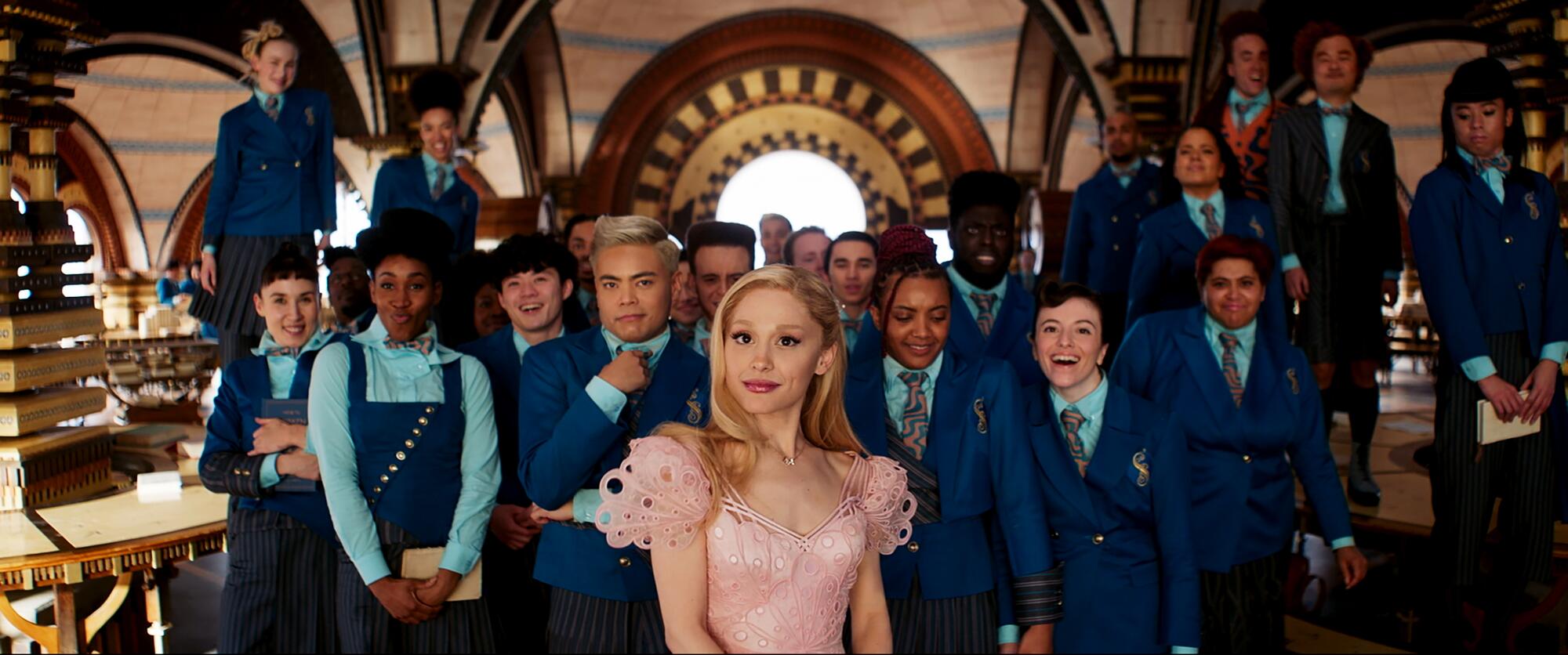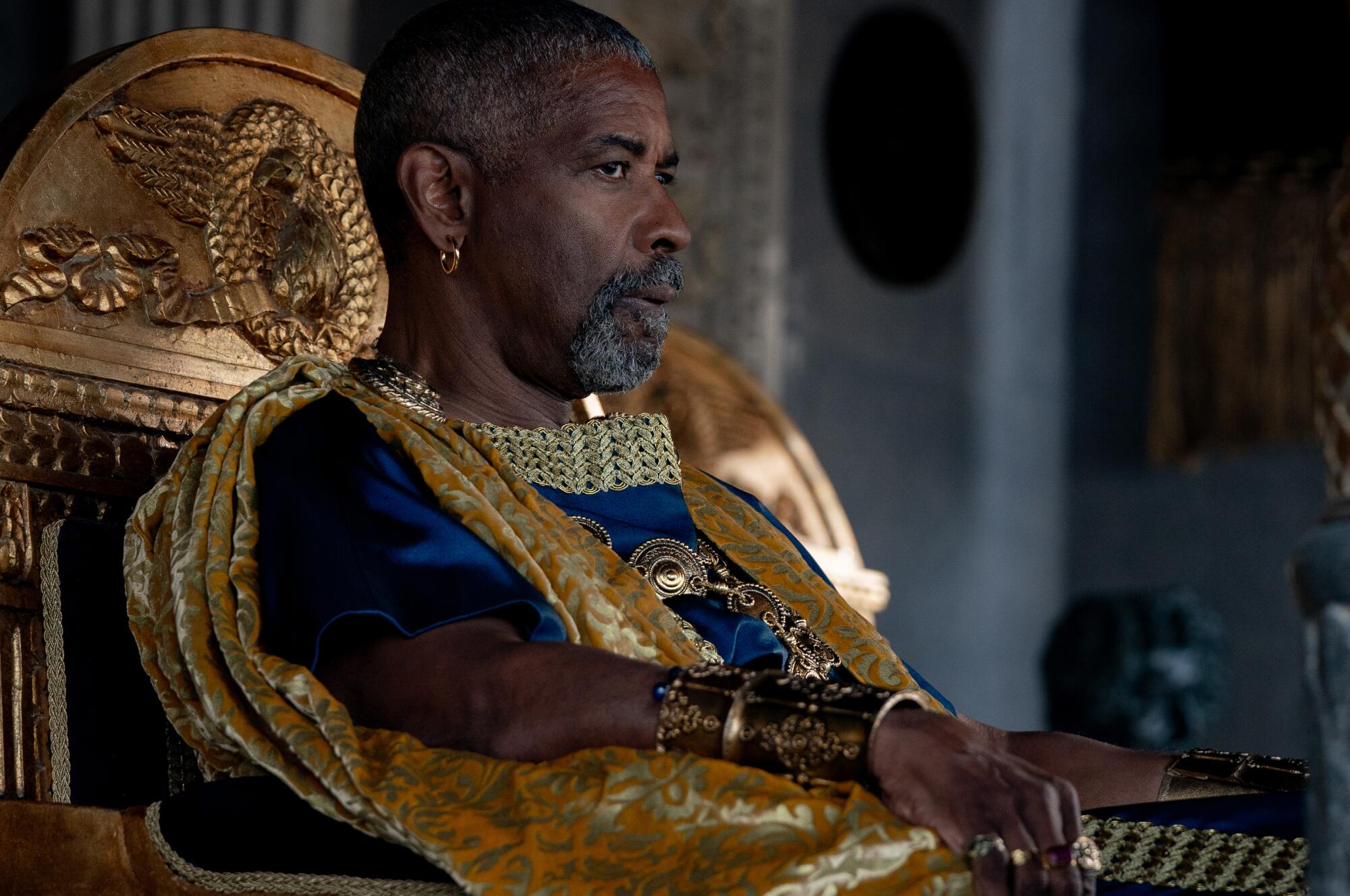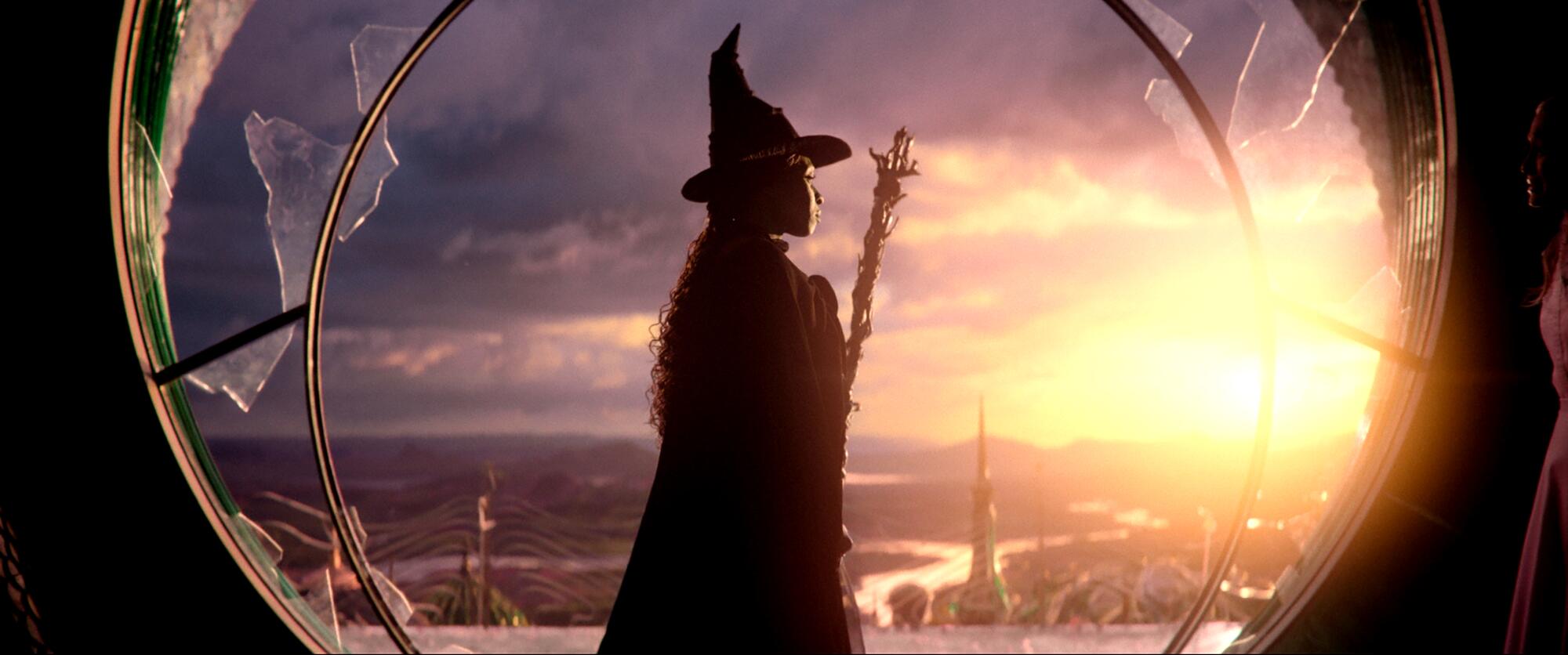
- Share via
A strongman ruler practices the fine political art of divide and conquer, insisting on loyalty at all costs. Except he says the quiet part out loud: ”The best way to bring folks together is to give them a good enemy.”
A once-proud empire, the envy of the rest of the world, slouches toward decadence and spectacle under the hand of emperors for whom the cruelty, and the entertainment value, are often the point.
“Wicked” and “Gladiator II” might not have the cultural clout or portmanteau appeal of “Barbenheimer” (“Glicked” just doesn’t tickle the tongue or the ear in quite the same way). As Justin Chang wrote in his New Yorker review of the two movies, “Both are chockablock with political conspiracies, authoritarian abuses and foul-tempered monkeys, none of which adds up to a full-blown phenomenon.”
‘I’m not interested in standing in front of a blue screen with a digital design,’ says ‘Wicked’ production designer Nathan Crowley. ‘I want to make things.’
But it does provoke a strange sort of whiplash between fantasy and current events, that sensation of wondering: What did the filmmakers know, and when did they know it? Are these escapist behemoths really somehow diagnosing the times in which we live? Or are we merely living through times in which almost everything seems like a diagnosis of events that cry out to be made sense of?
“Wicked,” based on a stage musical (deep breath) that premiered in 2003, which was based on a novel published in 1995, that was based on a movie released in 1939, that was based on a novel published in 1900, seems to have been written for the current moment. In fact, it’s almost too perfect. A good enemy? Squint a little when the powers of Oz rail against the distinguished talking animals in their midst and put them in cages and you can almost hear shouts of “Mass deportations now!”

When the proudly empty Glinda (Ariana Grande) objects to the lessons proffered by her history teacher (a goat), who explains that life in Oz hasn’t always been that peachy for some of its citizens, she responds in a way that would make proponents of campus “divisive concepts” legislation cheer: “I don’t see why you can’t just teach us history, instead of always harping on the past.”
First staged more than 20 years ago, during the George W. Bush administration, “Wicked” was obviously written before the current politics of divisiveness, resentment and scape(goating). Before a successful presidential campaign included the strategy of portraying trans people as some kind of existential threat to everything proper and good (“a good enemy”). Which serves as a reminder that while the specifics devolve, the general ideas have been floating in the ether for as long as power and office have been sought. The basic strategy: Punch down, and insist that everyone punch with you. Or else face the nebulous consequences.

The Machiavellian maneuverings of “Gladiator II” are certainly ancient — et tu, Macrinus? — as is the notion of blinkered, self-interested and extravagantly loony emperors, in this case Geta (Joseph Quinn) and Caracalla (Fred Hechinger), latching on to power for the sake of, well, winning. A skeptic might even point out that we did this dance 24 years ago, when the first “Gladiator” came out. But, as the online pundits like to say, it just hits different now.
Sharks? Maybe not. But sea battles, semi-aquatic creatures and plenty of other eye-popping spectacles were part of the real-life games at the ancient Roman Colosseum.
The increasing strain of U.S. isolationism has led many to consider the pending denouement of another empire, this one American. After all, we too are drawn to violent, meaningless spectacle to distract us from matters of substance. How else to explain the Mike Tyson/Jake Paul fight? Unfortunately, we haven’t found a way to fill a coliseum with saltwater and bloodthirsty sharks. Yet.
Movies take forever and a day to develop and produce; even if this weren’t the case, one should always be cautious with the “This is what the filmmakers are trying to say” game. You can twirl around like Dorothy’s house in a tornado trying to answer some essential questions here. Do filmmakers create stories that poke and prod at societal realities in order to meet a need, or do audiences respond and interpret through the lens they bring into the theater? When movies “hit different,” is it merely a matter of dumb luck, a confluence of intent, production schedules, release strategies and life outside the theater? And is film such a collaborative medium that it becomes futile to ascribe anything like intent in the first place?

The Glicked impact is more about how the movies feel as we watch them, those connections that click in the mind of the viewer when, for instance, Elphaba (Cynthia Erivo) asks her less-concerned fellow citizens: “Are we all gonna sit here in silence?” (The answer in “Wicked,” at least in this installment: Yes, for the most part). No place like home? We are home, everybody. One nation, under the wizard, unwilling or unable to take a look behind the curtain.
More to Read
From the Oscars to the Emmys.
Get the Envelope newsletter for exclusive awards season coverage, behind-the-scenes stories from the Envelope podcast and columnist Glenn Whipp’s must-read analysis.
You may occasionally receive promotional content from the Los Angeles Times.












